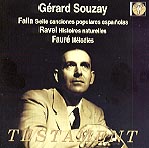Gérard Souzay’s slender but warm baritone, used with the utmost sensitivity and gift for timbral color, was a marvelous instrument for French mélodie and German lied. But he’s out of his element by a yard or two in Falla’s earthy Seven Popular Spanish Songs (“popular” in the sense of folk-based). Like everything this great singer did, the songs are done sympathetically, and he often lightens his voice to suit the style; but the great singers of this repertoire have been women, and alongside say, Teresa Berganza, his baritone sounds out of place, especially when he’s called upon to produce those quasi-flamenco “Ayeee’s”. The closely-miked 1951 Decca recording also is afflicted with traces of distortion in the fortes.
The Ravel Histoires naturelles from the same sessions goes much better. The dry wit of Jules Renard’s prose poems allied to Ravel’s sly settings calls forth a wealth of tonal variety from the singer, and in songs like “The Swan” he gives us legato singing that expertly mimics the proud bird smoothly gliding across the water. The accompaniments by Jacqueline Bonneau are fine too, especially in her lightly etched depiction of the grasshopper. However, it’s hard to avoid the feeling that the five songs of Ravel’s menagerie don’t come as naturally to Souzay as we might wish. There’s more irony in the music than this singer projects and he brings a touch more refinement than these songs want–so while this version is enjoyable, the verdict is, “close, but no cigar.”
But a whole walk-in humidor full of the best pre-Castro Havanas would be merited for the bulk of the disc–15 songs by Fauré, a composer for whom Souzay had a special affinity. The first five in Testament’s track order date from 1955 sessions with Dalton Baldwin; the remaining 10 are from 1950, with his then-regular accompanist, Bonneau. Here we find Souzay attuned to Fauré’s flowing lines and long-breathed melodies in a manner that’s missing from his performances of Falla’s folkish songs or Ravel’s more declamatory cycle. Souzay recorded many of these songs just a few years later in stereo, and after that for Philips, but this Testament reissue captures him in his vocal prime and with sufficient maturity (aged 32 and 37) that his later versions can be considered glosses on these. So he gives us a kaleidoscope of tonal colors in “Mandolin”, a dozen vocal shades of gray in “Prison”, and tender, long unbroken phrases that flow like the streams the lover watches in “Au bord de l’eau”. Fortunately too, the Fauré set is the best sounding part of the disc, though the engineers consistently place the singer too close to the microphones and the pianists too far. Full texts and translations are included.
































